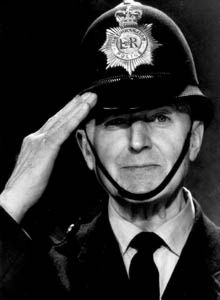
Who Dares Wins (U.S. title: The Final Option) was a 1982 British film that starred Lewis Collins fresh from his success as Bodie in The Professionals, Richard Widmark and Edward Woodward, directed by Ian Sharp. The title is the Motto of the elite Special Air Service (SAS).
The plot is largely inspired by the Iranian Embassy Siege of 1980, during which the SAS stormed the building to rescue those being held hostage inside. Euan Lloyd, the movie's producer, got the idea for the film after watching live television coverage of the event, but he had to move quickly to prevent the idea being scooped by somebody else. An initial synopsis was created by George Markstein. This was then turned into a novel by James Follett as The Tiptoe Boys, in thirty days flat. Meanwhile, chapter-by-chapter as the novel was completed, it was shipped to Reginald Rose in Los Angeles, who wrote the final screenplay.

The British security forces learn that a militant group attached to the anti-nuclear movement plans a significant act of terrorism, however their plant is unmasked and publicly killed during a protest march. To find out what is being planned, the security services recruit the services of the SAS. SAS officer, Capt Peter Skellen (Lewis Collins) is picked for the mission. After faking his dismissal from the SAS for beating two visiting counter-terrorist officers in a mountain training exercise, he goes undercover to infiltrate the militant group by seducing its leader. Despite his efforts, he is tailed during meetings with his contact and his wife. Knowing this, the terrorists decide they can use Skellen as a part of their plan and do not let him know that he has been found out.

The group kills the secret service go-between after tailing Skellen to a meeting, and later takes his wife and child hostage. Before he can report what he has learned to his superiors, the group executes its operation by hijacking a coach carrying a military band and uses their uniforms to gain access to the American ambassador's residence. They take over the building and demand that a nuclear weapon be fired at the Holy Loch submarine base in Scotland. When it becomes clear that negotiations will not work, the SAS is sent in to deal with the terrorists. Once informed that his family had been taken hostage, Skellen was forced to accompany the group on their hostage-taking operation, but was unarmed as he was no longer trusted by the group. During the siege he manages to communicate with those outside using a Morse code light signals through a bathroom window. The SAS leader signals back that a raid will begin at 10 a.m., so Skellen can be prepared when the power is cut.

At the appointed time, Skellen disarms a terrorist and uses his weapon to engage the terrorists. He kills several before linking up with his SAS colleagues who have now entered the house by abseiling from helicopters, and forced entry via the front door. At the end, he comes face to face with the group's leader. As he hesitates, she goes to kill him, but is killed by SAS soldiers.
Skellen's family is rescued by an SAS operation entering his house through a wall from the neighbouring flat, ending in the deaths of the terrorists and his family safe.

Who Dares Wins was also panned by some critics as being apparently right-winged. But, reportedly, it earned praise from notable filmmakers. Steven Spielberg and Robert Zemeckis, for example, told Ian Sharp they loved Who Dares Wins, and therefore they chose Sharp to work as the 2nd Unit director in their 1988 film, Who Framed Roger Rabbit. In a letter to producer Euan Lloyd dated 25th February, 1983, now in the collection of film director Malcolm Taylor, Stanley Kubrick wrote: "I must also take this opportunity to tell you how much I enjoyed "Who Dares Wins." Casting Judy Davis was a brilliant idea. I think she is the best young actress around and she brought instant credibility and dramatic interest to all her scenes."


















